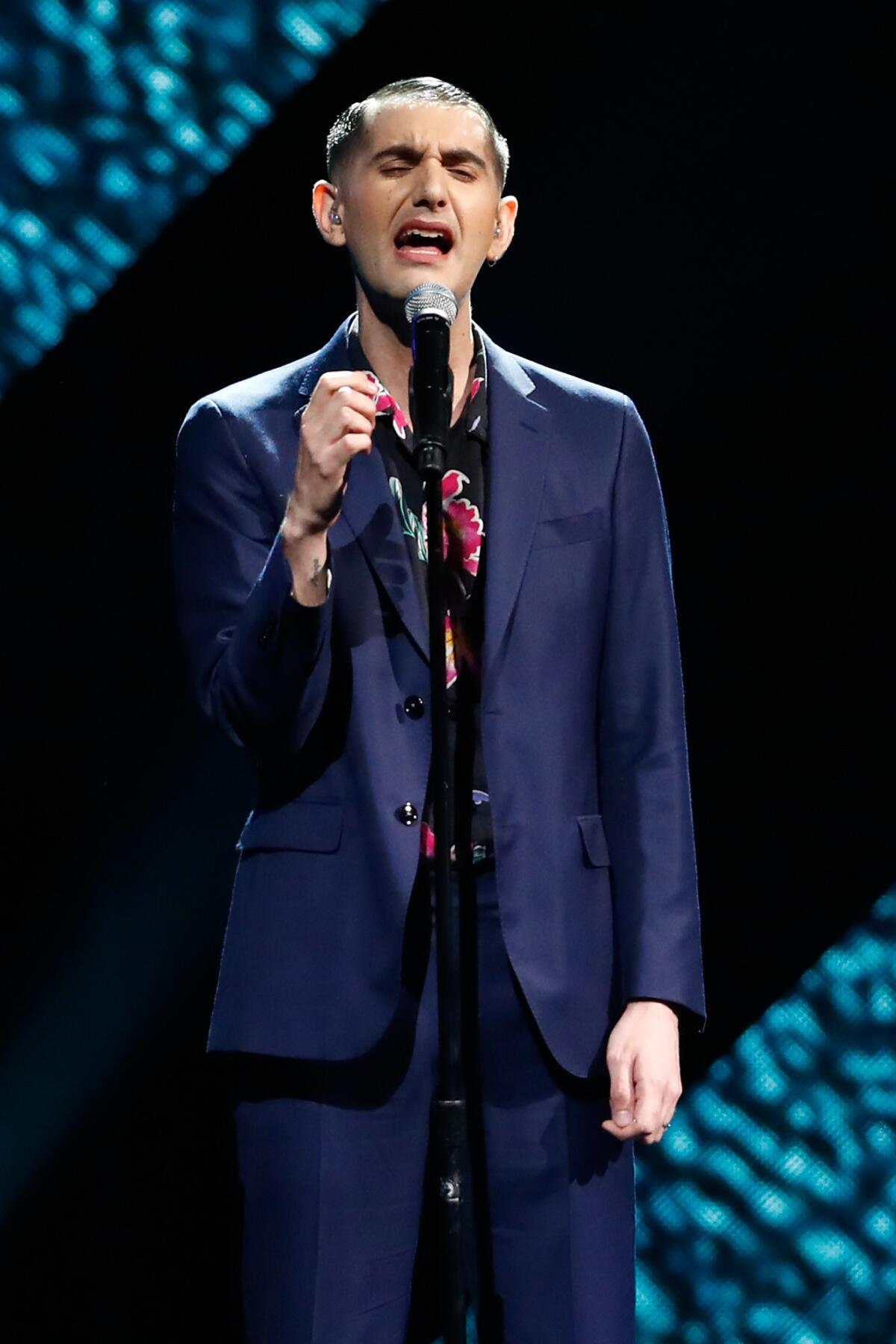Chilean pop singer Alex Anwandter just made his most political album

Alex Anwandter’s unbuttoned shirt is flapping in the breeze as if on cue during a photo shoot on the Main Street bridge over the L.A. River. Suddenly, a joyrider zooms by with an old-school welcome: “Esé!” The homeboy-style voice ricochets across several lanes toward the Chilean-born pop singer, inciting laughter among those around him.
Anwandter smiles but never loses his pose.
Beneath his unruffled demeanor is a focused artist — a musician and filmmaker with a meticulous eye for detail. Known for his upbeat dance anthems, heart-rending ballads and electro pop melodies, Anwandter, who has a substantial LGBTQ following, has been called Chile’s prince of political pop. And though he tried to steer away from politics in his newest album, “Latinoamericana,” it might be his most political yet. With a growing global audience, the Santiago native and recent L.A. resident, has entered a new phase, making music layered with deep meaning that reflects our current times.
“I tried not to go political again because I did feel like I pretty much exposed myself and my values,” says Anwandter, 35, of his past albums as he sits in a cafe after the photo shoot. “The approach I tried with this album was a little more historical. … I was trying to explore what we’re going through in Latin America, especially against a wave of conservatism ... a reactionary backlash to the gates of what we consider progress — and that’s been influenced by the election of Donald Trump. His type of discourse is being validated all over the world, America included. … It informed the whole emotional state of the album.”

Midterms 2018: How politics and the arts are colliding »
In the video he directed for the first single off the album, the dance-friendly track “Locura” (“Craziness”), he sings about feeling like he’s going crazy in a world gone mad as images of Trump on the television flash by. “What is this madness? / Is it real or did I imagine this hell?”
The track “Malinche,” whose title refers to the slave considered a traitor to her people for becoming an interpreter, adviser and lover to Cortez during Spain’s Aztec conquest, opens with a haunting pop overture woven in a rich violin arc that fuses into a series of lyrics that provoke and question: “Aren’t you embarrassed of what you’ve become?”
“Latinoamericana,” Anwandter admits, is “a dark set of songs” set to a danceable beat. “I do enjoy making proper old-school albums that have connections between songs and themes. This one, as the title kind of announces, explores themes of Latino identity, but also my usual stuff: gender, sexuality. … It’s kind of entertaining and yet anguished at the same time.”
A bittersweet move
Anwandter, who moved to Los Angeles in late 2017, says living in the U.S. helped the creation of his new music.
“California is very nice,” he says. “L.A. is so much fun, but it coincided with the Trump era, so it’s been very bittersweet. You have this person on the news around the clock and it’s a very intense discourse and it starts to affect people’s lives as well.”
The album was mixed in Los Angeles and many of the lyrics were inspired by events here, such as a friend being detained by ICE or watching coverage of shootings, including a fatality at the Trader Joe’s he frequents in Silver Lake.
It’s a very U.S. thing, mass shootings. It doesn’t happen in Chile.... It’s not normal. It’s very scary to me. Here it’s kind of normalized.
— Alex Anwandter
“It’s a very U.S. thing, mass shootings,” he says. “It doesn’t happen in Chile.... It’s not normal. It’s very scary to me. Here it’s kind of normalized.”
Anwandter is slim, tall and has a dry sense of humor. He also has a shy side but knows how to turn that into a James Dean gaze during a photo shoot with a dash of vulnerability. Then comes a moment of self-assuredness rooted in talk about why music is important and why it helps drive challenging themes, both emotional and intellectual.
He counts Burt Bacharach, David Bowie and Grace Jones as some of his musical influences, but going even deeper he talks about growing up in Santiago with parents who met while working and “it was love at first sight.” His dad was born in Brazil, but in 1980 moved to Chile. His mom’s Chilean family came from the countryside.
Raised in Santiago with his brother, Christian, his upbringing was riddled with class segregation, even though he says he “grew up in a house that didn’t have those prejudices of whom you have to hang out with.”
Music was part of Anwandter’s life from very early — his father played the guitar at home nearly every night — but it was his violin teacher who taught him, starting at age 6, to enjoy music by embracing it, playing it regularly and helping him find a zone away from stage fright.
“Whenever I face any stage I have the capacity of letting fear go,” Anwandter says. “I can instantly go into the feeling of making music and I know now that it’s very rare because I’ve seen people get stage fright and panic.”

That belief was at the epicenter of his 2016 Latin Grammy performance when Anwandter, who had received two nominations — including best new artist — sang “Manifiesto” during the pre-telecast. Although he could have played it safe and performed a fun, up-tempo song such as the fan favorite “Siempre es Viernes en Mi Corazón,” he chose the song that includes the lyrics, “El maricon del pueblo” (the village faggot).
“Getting [the Latin Recording Academy] to approve his performance of ‘Manifiesto’ was an ongoing conversation that took a lot of back and forth and perseverance,” says Tomas Cookman, the founder and CEO of Nacional Records. “I would not take no for an answer even though they did say no a lot of times at first. I felt it was an important song to do, especially for that audience and moment.”
It was the same year he released his first feature film as a director, “Nunca Vas Estar Solo,” about a young man who is gay bashed, and how the character’s father, a factory worker, must contend with the realities that his son faces.
Asked recently about Anwandter’s performance, Gabriel Abaroa, CEO and president of the Latin Recording Academy, says, “The Latin Recording Academy genuinely respects freedom of speech. We have never declined a song based on content matter or themes. … Our only limitation is time, and we ask them to remember the audience.”
For Anwandter’s part, he says, “Part of the whole purpose in singing “Manifiesto” is confronting ideas that are violent and widespread and just having someone shouting the opposite. … As an artist I find it important to be confrontational, which means you are standing for something.”
Anwandter’s independent profile is widening. “Siempre Es Viernes en Mi Corazón,” debuted at No. 17 on the Latin Pop Digital Songs Sales chart on April 23, 2016. “Amiga” debuted at No. 18 on the Latin Pop Albums chart that month as well. Earlier this year Anwandter produced a new voice in Chilean pop music, Francisco Victoria, who released his first album, “Prenda.”
“I think that the best advice he ever gave me was to always think in the process rather than the results,” Victoria says. “I apply that to almost every aspect in my life now.”
Anwandter is preparing to direct his next feature film in 2019, but won’t abandon his music.
“Music is much more spur of the moment, more emotional, more irrational,” Anwandter says. “I do narrative filmmaking, it has so many ideas. Film in that way of thinking, being so thorough, influenced the way I approach writing lyrics, and thinking [about] every concept, every word on every phrase … that’s very unusual these days in pop.”
No matter which medium he chooses, however, he holds one important standard for himself: “As an artist, my primary responsibility is to be honest.”

See the most-read stories in Entertainment this hour »
More to Read
The biggest entertainment stories
Get our big stories about Hollywood, film, television, music, arts, culture and more right in your inbox as soon as they publish.
You may occasionally receive promotional content from the Los Angeles Times.










